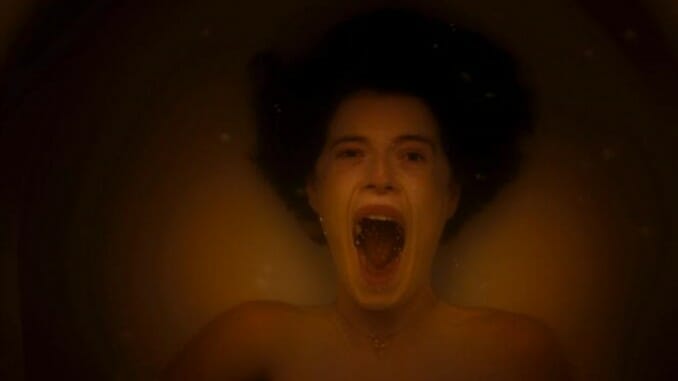Men and the End of Elevated Horror

When the trailer for Alex Garland’s Men was unveiled to the public back in March, I felt a bit incensed. Chic distribution and production company A24 has a habit of releasing similar trailers for the horror films they acquire: Sterile string plucking, piano key-tapping escalations of fast edits culminating in silence and a lead’s eerie one-liner. These previews serve to showcase, in part, that the company is both largely interested in the same kinds of horror films and also in promoting them in the same recognizable way. It’s wrong to judge a movie from its trailer; trailers can be misleading, intentionally and unintentionally, and should not be considered true markers of quality for a completed feature that one has yet to see. A24, for all its weirdo stans and pick-and-choose marketing style, also happens to release very good films, and Garland, an acclaimed screenwriter who previously helmed Ex Machina and Annihilation (the former of which was also distributed by A24), tends to make them. But the topic and title of Garland’s latest haven’t done it any favors since the trailer and, it turns out, the full film follows suit. Its heady superficiality and innate meaninglessness make it feel like a parody of modern horror.
A woman (Jessie Buckley) finds reprieve in the English countryside, only to be increasingly encroached upon by a series of antagonistic men who all share the same face (Rory Kinnear). Based on the premise showcased in the trailer and the title alone, it seemed a little too apparent what Men would be attempting to tackle at feature length. Along with the irritatingly composed trailer, it came off like another pseudo-intellectualized tackling of real-world social and psychological issues in the yearslong attempt to legitimize the perceived “low-brow” horror genre. Intrinsically bloodless, completely full of itself and a chore to get through. But I should be clear: The term “elevated horror” is just as annoying as the worst films within the designation. A horror film is a horror film, whether or not it’s got its head up its ass.
Still, Men immediately comes off as compounding the worst instincts of this misguided concept: Gore is sparse, indulgent metaphors abound and it wants to be taken very, very seriously. Adopted across the board by a large swath of modern American horror, these elements represent an approach to the genre that I have increasingly grown to detest. A24 is not alone in the distribution of these films. You can find them anywhere. It’s the style du jour, dealt by everyone from Neon (The Lodge) to 20th Century (Antlers). Even the better ones bog themselves down, trying to be topical in overt, heavy-handed ways. The otherwise delightful Fresh beats you over the head about the dangers of gender dynamics in modern dating. Sleazy slasher X (an A24 acquisition) discomfortingly stalls in its fixation on the horror of aging. The Night House ruins nearly every beautifully ambiguous detail with an ending that both explains everything away and literalizes its own metaphor.
And then you have Men, the ultimate culmination of what’s perceived as A24’s horror house style. A film that is so “about something” that it manages to mostly be about nothing. The camera lingers on imagery like a student film, as if holding the shot will encourage meaning to spring from an object instead of simply eating up time. Its crux is the idea that, as I wrote in my mixed-positive review (an opinion that has since soured, especially after a rewatch), women in horror are tormented by an interchangeable series of different, hostile male tropes which is transferable to how women are tormented by men in real life.
-

-

-

-

-

-

-

-

-

-

-

-

-

-

-

-

-

-

-

-

-

-

-

-

-

-

-

-

-

-

-

-

-

-

-

-

-

-

-

-








































